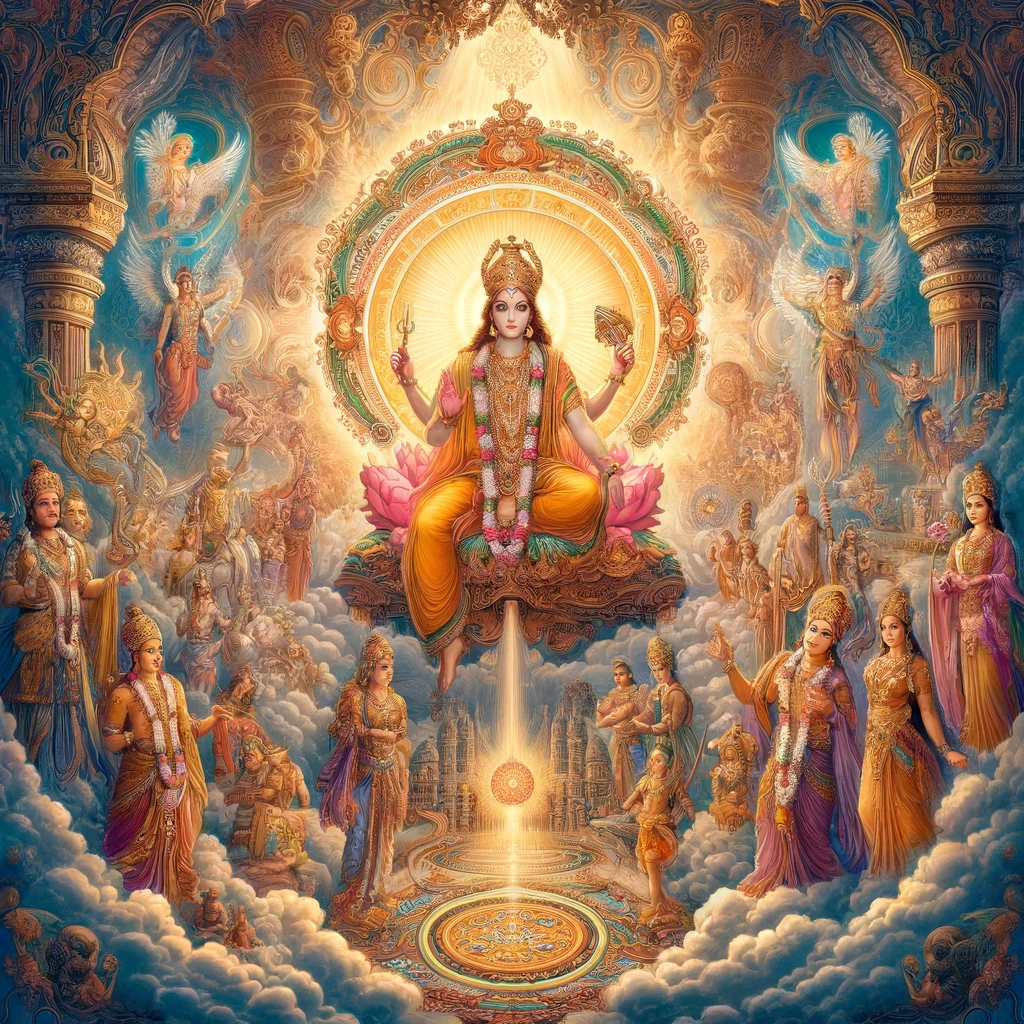ಸ್ಕಂದಃ ಸ್ಕಂದಧರಃ ಧುರ್ಯಃ ವರದಃ ವಾಯುವಾಹನಃ
ವಾಸುದೇವಃ ಬೃಹದ್ಭಾನುಃ ಆದಿದೇವಃ ಪುರಂದರಃ || 36 ||
skaṃdaḥ skaṃdadharaḥ dhuryaḥ varadaḥ vāyuvāhanaḥ
vāsudevaḥ bṛhadbhānuḥ ādidevaḥ puraṃdaraḥ || 36 ||
skaṃdaḥ (ಸ್ಕಂದಃ)
Skanda is commonly known as the son of Shiva, referred to as Kartikeya, Subrahmanya, or Shanmukha; this is the conventional meaning. Skanda also means to move, to emit, or to spring forth, offering several interpretations. He who caused the universe to emanate from His navel is Skanda. Breaking down the name: 's+k+da'; as mentioned earlier, 's' means essence or knowledge, 'ka' or 'kam' means bliss, and 'da' means the giver or the one who withholds. Therefore, Skanda is the one who provides the bliss of knowledge to the virtuous and keeps the wicked away from this bliss of knowledge.
skaṃdadharaḥ (ಸ್ಕಂದಧರಃ)
Skandadharaḥ means the one who bears Skanda. Skanda is born as 'Śhaṇmukha' to Shiva, as 'Sanat Kumāra' to Brahma (Chaturmukha), and as 'Kāma' to Vishnu. Thus, the Lord, who carries Skanda and receives him as a son, is Skandadharaḥ. As mentioned earlier, Skanda represents the giver of knowledge and bliss. Those who bestow the experience of knowledge and bliss are our soul-identifying deities like Brahma (Chaturmukha) and Prāṇa. The Lord, who embodies these deities of individual souls, is Skandadharaḥ.
dhuryaḥ (ಧುರ್ಯಃ)
Dhurya means 'leader' or 'foremost'. In every group of living beings in the world, we see a leader. In a herd of elephants, one leads, and the others follow. Similarly, in a troop of monkeys, a leading monkey guides, and the rest follow. In battles, when the leader courageously engages the enemy, others follow their lead. In the Mahabharata war, Bhima and Arjuna acted as leaders, fighting valiantly to secure victory for Dharmaraja. In Arjuna's chariot, the 'Dhurya' was none other than Sri Krishna himself. Thus, the Lord is present as 'Dhurya', the leading principle, in every leader. The Lord, as the one who leads and inspires every significant endeavor, is Dhuryaḥ.
varadaḥ (ವರದಃ)
Varada means 'the giver of boons' and also the one who nullifies the boons given to the unworthy. The Lord grants the desired boons to His worthy devotees, and similarly, when evil beings like Hiranyakashipu misuse the boons they receive, He annihilates them to protect the devotees. Thus, the Lord, who bestows upon His devotees what they desire, is Varadaḥ.
vāyuvāhanaḥ (ವಾಯುವಾಹನಃ)
Vāyuvāhana means the one who rides or controls the 'wind principle' or 'prāṇa'. The Lord, who embodies the principle of life and steers the body's chariot under the guidance of air (vāyu), is Vāyuvāhanaḥ. The Lord, having instilled air (vāyu) within us, bestows life itself and is thus the ultimate Vāyuvāhana. 'Vāyu' signifies the force that weaves the entire universe. Just as the Lord has intricately woven the five elements to form our physical bodies, similarly, He has intricately arranged and united the cosmos. The Lord, who sustains the entire world with His power imbued with wisdom, is appropriately named Vāyuvāhana, indicating His role as the master and controller of the vital life force.
vāsudevaḥ (ವಾಸುದೇವಃ)
The name Vāsudeva of the Lord appears three times in the Vishnu Sahasranama (333, 699, and 713). This name can be interpreted as follows: 'Va+Asu+Deva'. Previously mentioned, 'Va' means knowledge; 'Asu' denotes the energizing principle; 'Deva' implies play. For the Lord, who is the embodiment of knowledge, governing the entire universe is a mere play. Creation, sustenance, regulation, knowledge, ignorance, bondage, and liberation – all are mere pastimes for Him. Looking at this name in another way, 'Vā+Sū+De+Ava'. Here, 'Vā' signifies omnipresence (all-pervading, omniscient); 'Sū' or 'Sūte' means the creator of everything (the universal creator); 'De' means the giver of everything (the universal provider); 'Ava' implies the protector of all (the universal protector). Vasudeva also means 'shining wealth'; the light that bestows a sattvic mind. Vasudeva manifests only in a purely sattvic mind. Among the Eight Vasus, Agni (fire) is a significant representation, and the Lord, who dwells and roams everywhere, encompassing everything, is Vasudeva.
bṛhadbhānuḥ (ಬೃಹದ್ಭಾನುಃ)
The one who illuminates all the grand sources of light in this world is Bṛhadbhānu. There are five principal sources of light both outside in the world and within us. (1) The Sun, the biggest source of light visible to human eyes, is our visual faculty's presiding deity. (2) The Moon, which brings cool delight and presides over our auditory sense. (3) Fire, the most significant source of light on Earth, and the deity of our speech. (4) The stars surrounding the Moon; they shine within us in the form of cognition through our eyes, ears, and speech. As knowledge grows within us, the fifth and most important light shines forth. (5) This fifth crucial light is 'lightning,' representing the flash of truth within us. Thus, the Lord who illuminates our eyes, ears, mouth, mental processes, inner revelations, as well as the external Sun, Moon, Fire, stars, and lightning is Bṛhadbhānuḥ.
ādidevaḥ (ಆದಿದೇವಃ)
The one who existed before creation, who dwells within the Sun as its inner controller and illuminator, and who is the primary cause of everything, is the Supreme Lord Ādidevaḥ.
puraṃdaraḥ (ಪುರಂದರಃ)
The city of the four-faced (Brahma) is this universe; our city is our body. At the time of dissolution (Pralaya), he who breaks apart this universe; he who splits the city that is our body, according to our fate; he who breaches the subtle body of those worthy of liberation, and sustains our true self in the form of the soul; he, the Lord, who demolishes the cities of enemies, is Purandara.


